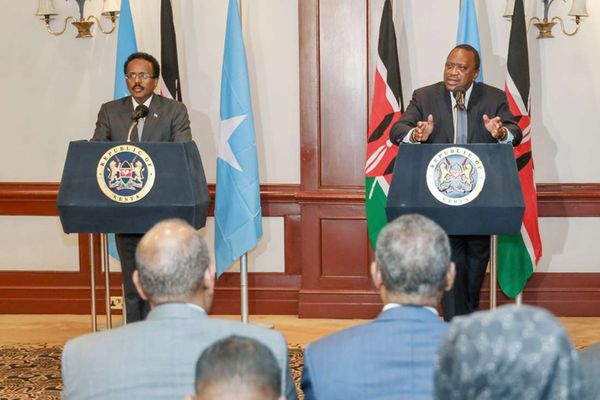
President Uhuru Kenyatta holds a joint press conference with his Somalia counterpart Mohamed Abdullahi Farmaajo at a Nairobi Hotel
 by Abdirisak M. Aden
by Abdirisak M. Aden
Tuesday June 1, 2021
When colonialists arrived on the East African shores, they found ethnic Somalis living in a region that is today divided into four countries: Kenya, Somalia, Djibouti and Ethiopia. And having gone to separate masters, these countries formed artificial boundaries to ensure control of the colonialists.
In the modern world, those boundaries have become more and more fluid, banking on cultural connections between the people, trade deals and common problems afflicting the region.
Yet between Kenya and Somalia, things seem to have worsened recently. In December, 2020, Somalia cut ties with Kenya, accusing Nairobi of “constant political violation and Kenya’s open interference in Somalia’s independence.” It was a culmination of accusations against Kenya in which Mogadishu had complained of Kenya’s attempts to influencing of politics in certain federal states like Jubbaland.
In December, Kenya initiated a diplomatic offensive with Somaliland. And coming in the wake of frostiness with Mogadishu, it has looked like a move to punish Somalia. This would be contrary to the AU, UN charter, both of which encourage sovereignty of member states.
Kenya needs to grasp the reality that while all Somalis support and enjoy the relative peace, democracy and stability in Somaliland, they still believe that one day Hargeisa and Mogadishu will resolve their difference amicably.
In truth, neither the AU nor the UN recognise Somaliland as an independent state. So, as a member of UN Security Council and one of the troops contributing countries in Somalia (under AMISOM), Kenya's prime foreign policy objectives ought to be to support the efforts of united, peaceful Somalia peace with its self and peace with its neighbours.
Somalia as a sovereign nation was, of course, in its every right to sever ties or complain of any interference, especially as the country struggles to stand on its own feet after years of violence and weak institutions. That, however, doesn’t mean cutting relations was benefiting anyone, not even Somalia itself.
Row 'unnecessary'
Indeed, many Kenyans, and Somalis in these countries and elsewhere say the diplomatic frostiness is unnecessary. In public, Somalia indicated they took the abrupt, but unfortunate decision, to secure the country’s sovereignty. Nairobi termed the decision by Mogadishu regrettable, suggesting the two countries were better off handling their squabbles while talking with each other, rather than shutting doors.
This far, both sides agree that their relations matter more than anything else. They also agree that they will continue to be neighbours, living side by side, in the same weather. A tiff is likely to only benefit dangerous groups like Shabaab.
So how do we resolve this impasse? In early May, Somalia announced it was restoring diplomatic ties with Kenya, “in the interest of good neighbourliness” and mutual respect. To date, however, both countries’ ambassadors have not resumed duty, living everything in limbo.
Also read: Kenya stays out of Somalia chaos, with a long hand
And from the outset, it appears to be due to a fault in policy on the part of Nairobi. There are no problems with Kenya seeking to protect itself from al-Shabaab, by creating a buffer. But Nairobi must know that foreign policy of Somalia is the ambit of the Federal Government of Somalia, not federal member states.
Kenya’s interaction with federal member states must not be to the detriment of that Federal Government, which it incidentally helped rebuild through the auspices of the Intergovernmental Authority on Development as well as the African Union.
Strategic benefits
Nairobi has, for the last decade, allied itself with Jubbaland, and could command significant influence at the moment. But Kenya’s interest is better served if the federal government is strengthened more and seen as an ally, not a spoiler. Here is how:
When Somalia shut down Khat imports from Kenya, the impact spread through Kenya’s economy like wild fires. Suddenly, farmers from Nyambene, in Meru County, which is the heart of Khat production in Kenya, were protesting at their own government for mismanaging relations with their biggest market country.
Before this shut down, at least 25 planeloads of miraa [khat] were shipping to Somalia from Kenya every day. According to an association of khat farmers, they were earning some $400,000 a day, a big sum in these parts of the world. The trade was not one-sided, and Somalis who provided a healthy demand also ensured their local traders remained in business and earned bread.
There was more. Because of the lucrative business connections between people, it automatically expanded their business to other areas. Some 30,000 Kenyans work in Somalia at any given time in hotels, schools and logistics firms. Daily flights between Nairobi and Mogadishu increased as Somalia became more stable.
A rough estimate shows that most of the planes that operate passenger flights in Somalia have been rented from Kenyans, owing to Nairobi’s fairly stable and developed aviation sector.
Severed relations became a threat on these jobs, however. It was worse for commercial airlines as they cannot operate direct flights anymore.
More on this: Kenya allows two flights to Somaliland despite ban
Read: Somalia learnt of Kenya flight ban from media, minister says
With flights cut, it also meant tourists, able Somalis who frequent Kenyan parks cannot come. You are unlikely to travel to your favourite destination if it suddenly costs an arm and a leg.
As a result of the ongoing diplomatic rift, the unstable aviation industry between Somalia and Kenya has forced many business people to move to Turkey in a trend began three years.
Based on these strategic benefits, it behoves Nairobi to adjust its policy to look beyond the political differences Kenya may have with President Mohamed Farmaajo of Somalia. The long term benefits for Kenya and Somali in their relations lie in mutual respect and open channels.
The future
There are certainly going to be many more tiffs as is normal for neighbours. But none of them are sufficient reason to play politics of undercutting each other. It will also be a strategic foreign policy mistake if Kenya focuses only on Khat trade as the measure of relations with Somalia. As we have seen, the trade between Kenya and Somalia goes beyond the stimulant.
And we have not even spoken of the rising Somali investment in Kenya. Data from Kenya showed that Nairobi’s trade with Mogadishu averaged Sh11 billion, benefiting from aviation connections.
As Kenya has been as crucial in diaspora remittances to Somalia, the Somali diaspora themselves are putting money into various sectors of Kenya; real estate, logistics and transportation as well as financial institutions.
If you walked into Kenya’s major towns today, you will see money transfer operators like Amal, Iftin, Dahabshill, Ta Express, Salaam Investment Bank [Djibouti bank but with heavy investments by Somali business people] and others; all of who are associated with Somali diaspora and giving thousands of Kenyans jobs.
Every year, the Somali diaspora sends home sends home some $1.6 billion to their relatives in Somalia, beating the moneys sent there for humanitarian and development assistance, or averaging about 40 percent of the GDP.
Of course Covid-19 may have curtailed this constant flow, to some extent . But there is no denying that some of these money is remitted through, from, or involves Kenyans.
Abdirisak M. Aden is the Executive Director of Farsight Africa Research and Policy Studies. He can be reached at [email protected]